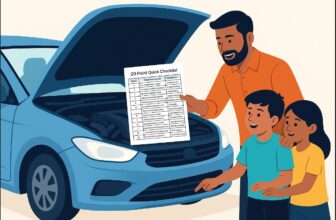Buying a new car is an exciting experience, but it can also be overwhelming. In India, where cars are an essential part of daily life, making an informed decision is crucial to ensure you get the best value for your money. Many buyers, especially first-timers, fall prey to common mistakes that can cost them more in the long run, both financially and in terms of convenience.
In this post, we’ll walk you through 20 common mistakes that car buyers make when purchasing a new car in India, and we’ll offer practical tips on how to avoid them. Whether you’re buying your first car or upgrading to a new one, understanding these mistakes will help you make an informed decision and drive away with the perfect vehicle.
1. Focusing Only on the Ex-Showroom Car Price
Many car buyers get fixated on the car’s initial price, thinking that’s the most important cost. However, this often leads to overlooking additional costs such as taxes, registration, and insurance, which add a significant amount to the overall price.
- Always factor in the total cost of ownership, including recurring costs like maintenance, insurance, and fuel.
2. Ignoring the Car Maintenance Costs
While fuel efficiency often gets a lot of attention, maintenance costs are equally important, yet many overlook them. Some cars might seem affordable upfront but can have high maintenance costs due to expensive spare parts or frequent servicing requirements.
- Research the maintenance history of the car brand. Cars from brands with a well-established service network tend to have more affordable maintenance.
3. Not Considering the Car’s Total Cost of Ownership
It’s easy to forget that the price of a car isn’t just about what you pay at the dealership. Other costs like fuel consumption, servicing, insurance, and depreciation affect the long-term cost of ownership.
- Take into account all costs over the next few years, including regular servicing, spare parts, and insurance premiums.
4. Not Test-Driving the Car
Many buyers skip the test drive because they’re already sold on a particular model or the dealer pushes them to make a quick decision. However, not test-driving means missing out on important insights about the car’s comfort, handling, and driving experience.
- Always test-drive the car on different roads and check the comfort, driving experience, noise, and visibility.
5. Overlooking After-Sales Car Service
After-sales service quality can make or break your car ownership experience. Brands with poor service networks or long wait times for spare parts can turn your car buying experience into a nightmare.
- Research the brand’s reputation for after-sales service and check the warranty coverage.
6. Not Researching Resale Value
Many buyers forget to consider the car’s resale value, which could impact how much you can sell the car for after a few years.
- Choose models and brands that retain their value well over time. Cars from mass-market brands like Maruti Suzuki, Hyundai, and Honda often have better resale values in India.
7. Ignoring Car Safety Features
While the car’s appearance and performance are important, safety should be a top priority. Many buyers overlook essential safety features like airbags, ABS, EBD, and crash test ratings.
- Always check the car’s safety features, ratings, and if the model includes essential features like airbags, seat belt warnings, and crash test performance.
8. Choosing the Wrong Car Type for Your Needs
Choosing the wrong type of car for your needs can lead to frustration later. For example, a compact car may be perfect for city driving, but you might need more space for family trips. Similarly, a larger SUV might seem appealing but could be impractical for narrow city roads.
- Think about how you’ll use the car on a daily basis. If you have a family or need to haul luggage frequently, opt for a larger vehicle. If you mostly drive in the city, go for a compact or sedan.
9. Overlooking the Car’s Warranty
Many buyers don’t pay enough attention to the terms of the car’s warranty. A comprehensive warranty can save you from future repair costs, especially if your car is still under warranty.
- Read the terms of the warranty and know exactly what’s covered, including the duration and the parts covered under the warranty.
10. Not Considering Loan EMI Affordability
It’s easy to get caught up in the excitement of buying a new car, but you must ensure that your monthly EMI fits within your budget. An overly high EMI can stress your finances over time.
- Calculate your loan EMI before making the purchase and ensure it comfortably fits within your monthly budget. Use an EMI calculator to plan.
11. Forgetting to Factor in Loan Interest Rates
Many buyers only focus on the loan amount and neglect the impact of high-interest rates, which can lead to paying much more for the car in the long run.
- Compare interest rates from various lenders to get the best deal. Ensure you understand the terms of the loan.
12. Not Understanding the Vehicle’s Depreciation
New cars depreciate quickly, and the value decreases by a significant percentage within the first few years. Many buyers overlook this when making a purchase.
- Research the depreciation rate of the car you’re buying. Opt for cars that have slower depreciation, which typically comes from popular and reliable models.
13. Rushing the Decision
The car-buying process can be long, but rushing it can lead to poor choices. Many buyers feel pressured to buy quickly due to discounts or promotional offers.
- Take your time and explore all options before making a final decision. Avoid pressure from salespeople or time-limited offers.
14. Over-Purchasing Car Features You Don’t Need
Some buyers opt for higher variants with more features than they really need. This can lead to overspending on unnecessary features that don’t add value to their daily use.
- List the features you actually need and avoid paying for extras you won’t use. Stick to your needs instead of the features that are part of higher variants.
15. Ignoring the Brand’s Reputation
Sometimes, buyers focus too much on the car’s looks or performance and ignore the brand’s overall reputation, including reliability and customer support.
- Research the brand’s reputation for quality, reliability, and customer service. Check reviews, ratings, and user experiences before making a choice.
16. Not Considering Traffic and Parking Needs
If you live in a city with heavy traffic or limited parking space, buying a large SUV or sedan might not be practical.
- Consider your living conditions—narrow roads, traffic, and parking space—before deciding on the type of car to buy. A compact car may be a better choice.
17. Ignoring Fuel Efficiency for City Driving
While fuel efficiency is often considered, some buyers forget to check how fuel-efficient a car is for city driving versus highway use.
- Pay attention to both city and highway fuel efficiency. Choose a car that offers a balance of both for your daily commute.
18. Not Researching Car Insurance Costs
Car insurance can be a significant ongoing cost. Buyers often ignore how much the car insurance will cost and whether it fits their budget.
- Get a clear idea of the insurance premium before purchasing the car. Some models have lower premiums based on safety features and the car’s age.
19. Choosing Looks Over Practicality
It’s easy to fall in love with a car’s design or color, but these factors should not outweigh practical needs, like seating capacity, ease of driving, and reliability.
- While aesthetics matter, always prioritize functionality and practicality for your everyday needs over looks.
20. Not Asking for Discounts or Deals
Car dealers often have room for negotiations. Many buyers accept the first offer without asking for discounts, offers, or additional perks like free accessories.
- Don’t hesitate to negotiate. Ask for additional perks, discounts, or special offers before closing the deal.
Summary – Errors You Must Avoid When Buying a New Car
Buying a new car is a significant financial decision, and making informed choices is essential to ensure you get the best value. By avoiding these 20 common mistakes, you can make a more confident and well-thought-out purchase. Remember to consider all aspects, from safety features and fuel efficiency to after-sales service and resale value.
Take your time, do thorough research, and don’t rush the process. With the right approach, you can find the perfect car that suits your needs.





